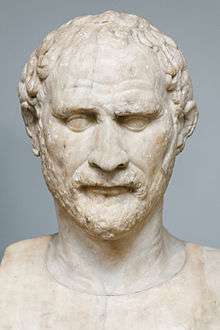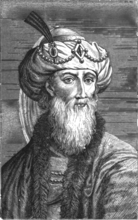Ninos (priestess)
Ninos or Nino[lower-alpha 1] was an ancient Athenian woman who was executed at some point in the classical period. Her case is known through three mentions in speeches by Demosthenes – Against Boeotus I and II, and On the False Embassy – and one in Josephus.[2] The prosecution was apparently brought by a man named Menecles, who would go on to be prosecuted in turn by Ninos' son.[3] The date of the prosecution is uncertain: Against Boeotus I was delivered in 348, which provides a terminus ante quem; Esther Eidinow suggests a date of between 362 and 358 BC.[4] The case was apparently well known in the mid-fourth century, as Demosthenes refers to it in his speeches as if the jury are expected to be familiar with the case.[5]
According to Demosthenes, Ninos was a priestess, and was charged with bringing together thiasoi. One scholiast on this passage says that her crime was mocking the Dionysian Mysteries; another says that she made love potions.[6] It is unclear where the scholiast's information about love potions comes from – Eidinow suggests that it is a misinterpretation of Demosthenes' text,[1] while Professor Matthew Dickie says that the comment "does not emerge from anything in the text of Demosthenes" and may have been derived from an Atthidographer or another speech.[3] Finally, Josephus lists Ninos as one of five Athenians put to death for asebeia (impiety).[3]
Notes
- Ninos' name is given in the surviving sources only in the accusative, as Ninon (Νινον); it is uncertain whether the nominative was Ninos or Nino, though most scholars use Ninos.[1]
References
- Eidinow 2010, n. 11.
- Eidinow 2010, pp. 13–14, n. 11.
- Dickie 2003, p. 52.
- Eidinow 2016, p. 20.
- Eidinow 2016, p. 19.
- Eidinow 2010, p. 13.
Works cited
- Dickie, Matthew (2003), Magic and Magicians in the Greco-Roman World, London: Routledge
- Eidinow, Esther (2010), "Patterns of Persecution: 'Witchcraft' Trials in Classical Athens", Past & Present, 208
- Eidinow, Esther (2016), Envy, Poison, and Death: Women on Trial in Ancient Athens, Oxford: Oxford University Press

